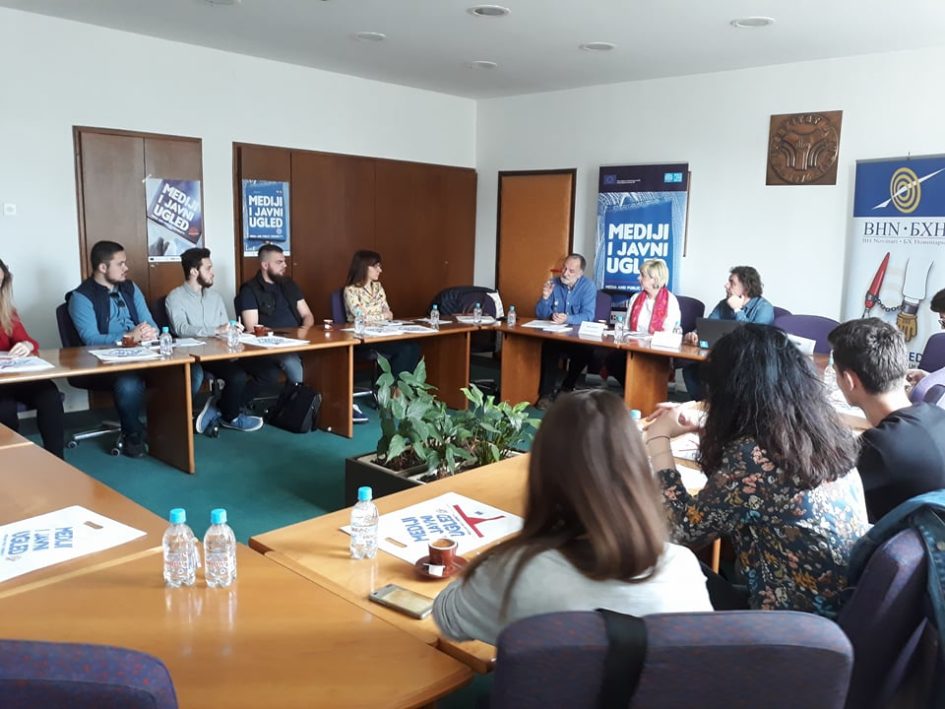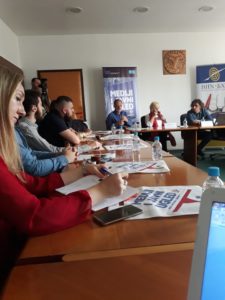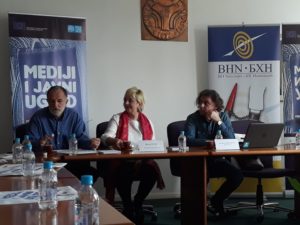
TUZLA, 10.04.2018. – In Bosnia and Herzegovina, it is necessary to adopt the Law on Media Ownership Transparency in accordance with the recommendations of Council of Europe, and to work on the creating media policies aimed at establishing legitimate public media funding, protecting the freedom of the media, promoting the public interest and professional standards of journalism, what is in the interest of public and democracy, concluded participants of the focus group “Financing the media from public budgets”, which was held yesterday in Tuzla.
 Institutions at all levels spend about 30 million KM per year on the media, although the public is not familiar with the tender procedure, nor with the conditions that media outlets must fulfill in order to receive support from the public budget. At the same time, the question arises as to are the media-users of public funds able to consider the public interest and adjust their program content to the needs of all citizens?
Institutions at all levels spend about 30 million KM per year on the media, although the public is not familiar with the tender procedure, nor with the conditions that media outlets must fulfill in order to receive support from the public budget. At the same time, the question arises as to are the media-users of public funds able to consider the public interest and adjust their program content to the needs of all citizens?
The general secretary of the BH Journalists Association, Borka Rudić emphasized that the key question is how to ensure an independent system of decision-making for allocating funds, and who will develop criteria. „One of the problems that we will face is forming of a commission that will decide who is the best candidate for the grant, or who can be in the commission, and then who will choose this commission“, said Rudić and added that media that receive funds in this way hardly retain editorial independence, as this becomes one of the means of political pressure on the media..
Impact on editorial policy can be prevented through regulations in the media outlet statute, by establishing a public and transparent procedure nominating editors and journalists, with clearly defined professional criteria, as well as by introducing a clause of awareness and improving the status and respect for labor rights.
Professor at the Faculty of Philosophy, University of Tuzla dr sc. Enes Osmančević believes that despite a steady decline in revenue, a large number of the media survive on the market because they are maintained by business and political actors at the state and local levels in exchange for obedience. „BiH does not have a publicly available media register where you can see the impressum, property and origin of capital, so you do not know what are the intentions of the media, and in return you get a lot of anomalies in communication, bias, agitation in the media, and eventually blurred image of the audience“, emphasized Osmančević.
 Doc. dr Mirza Mehmedović from the Faculty of Philosophy in Tuzla believes that when accessing European Union we will face a new problem because the EU does not know the public media system that exists in BiH. „We have too many so called public media, and they are not publicly responsible, but receive money from public budgets based on private connections with government officials, from the budget that the public fills, and money is given to someone although we do not know how it is being spent“, said Mehmedović.
Doc. dr Mirza Mehmedović from the Faculty of Philosophy in Tuzla believes that when accessing European Union we will face a new problem because the EU does not know the public media system that exists in BiH. „We have too many so called public media, and they are not publicly responsible, but receive money from public budgets based on private connections with government officials, from the budget that the public fills, and money is given to someone although we do not know how it is being spent“, said Mehmedović.
Apart from unregulated ownership and media financing, BiH did not protect its media market from the impact of media from other countries. Some “foreign” media sell advertising space in their countries of origin, and the press freely enters the domestic market through available channels without paying a commission or tax.
The president of BH Journalists Association Marko Divković pointed out that it is very well known in our country that the state money is financed by private media, non-transparent and unconditional, which opens up possibilities for manipulation by the public. „We live a brutal occupation of the media scene, on one side there are “foreign media” that take part in a market cake, and on the other, constantly non-transparent financing“,said Divković.
The president of the Journalists club Tuzla Bedrana Kaletović explained the method of allocating public funds in smaller environments: „When it comes to a public grant you are usually asked to fill out a paper with few data, regardless of whether you are a media that meets the public interest, you automatically enter the drum where you know that you will receive funds, you are just not sure about the amount of those funds. You do not have to have a plan for spending the grant, nor justify it“, said Kaletović.
In order to solve the problems that currently burden the media market, BiH will have to adopt a Law on Media Ownership Transparency, with whom media will accept responsibility to publicly and transparently publish reports on the funds they use.
The focus group in Tuzla was held within the project “Media and public reputation” implemented by the Consortium of the Press Council in BiH, Mediacentar Sarajevo, NGO JaBiHEU and BH journalists Association, with the financial support of the European Union.